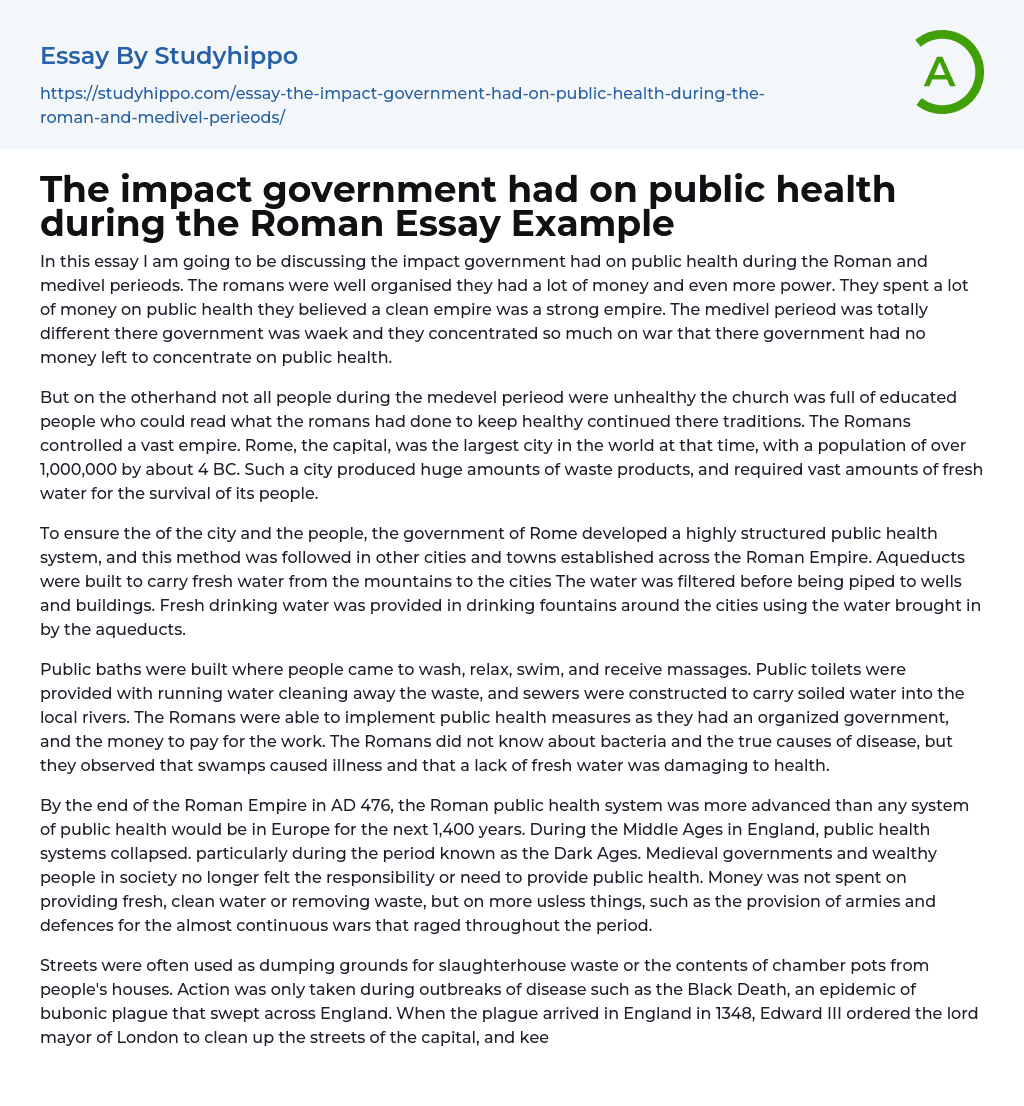

The impact government had on public health during the Roman Essay Example
I will analyze the impact of government on public health in both the Roman and medieval periods. The Romans, renowned for their efficient organization, vast wealth, and immense power, allocated considerable resources to enhance public health. They firmly believed that maintaining cleanliness was essential for a resilient empire. In contrast, during the medieval period, the government prioritized warfare over public health due to its weakness, resulting in insufficient financial allocation for public health.
Despite the overall poor health of people in the medieval period, there were exceptions. The church provided a haven for educated individuals who were able to read about and continue the Roman practices of maintaining good health. Being in control of a vast empire, the Romans had Rome as their largest city during that time, which had over 1,000,000 residents around 4 BC. This thriving city produced significant amo
...unts of waste and required substantial supplies of fresh water to support its population.
The government of Rome implemented a well-organized public health system to safeguard both the city and its inhabitants. This approach was adopted in other cities and towns within the Roman Empire. Aqueducts were constructed to transport clean water from the mountains to urban areas. The water underwent filtration before being distributed to wells and structures. Drinking fountains were installed throughout the cities to provide fresh drinking water using the water supplied by the aqueducts.
Public baths were constructed for individuals to wash, unwind, swim, and obtain massages. Public toilets were outfitted with flowing water to cleanse away waste, and sewers were developed to transport contaminated water into nearby rivers. The Romans could implement measures regarding public health due to their organized government an
financial resources. Although the Romans were unaware of bacteria and the actual causes of diseases, they noticed that swamplands led to illness and that inadequate access to clean water harmed one's well-being.
The Roman public health system was more advanced than any European system for the next 1,400 years, until the end of the Roman Empire in AD 476. In England during the Middle Ages, especially in the Dark Ages, public health systems collapsed. The responsibility and need to provide public health was no longer felt by medieval governments and wealthy individuals. Instead, money was spent on useless things like armies and defenses for the ongoing wars that occurred during this time. Fresh, clean water and waste removal were not prioritized.
The streets were frequently utilized for disposing of slaughterhouse waste and the waste from chamber pots in people's homes. Measures were only taken to address this issue during disease outbreaks like the Black Death, a bubonic plague epidemic that spread throughout England. When the plague reached England in 1348, Edward III commanded the lord mayor of London to improve the cleanliness of the streets in the capital city and prohibit the presence of animals and slaughterhouses within the city. Furthermore, public toilets were to be implemented, and the disposal of waste on the streets was banned.
Despite the subpar implementation, advancements persisted until the 14th century. It is important to note that not all individuals in medieval times were uneducated; churches often accommodated learned scholars who examined Roman historical writings and promoted good habits. Hence, I argue that the welfare of a society is affected by the caliber of leadership. The Romans possessed substantial riches and
prioritized public health, resulting in their populace enjoying lengthier lives as opposed to those residing in medieval times.
During the medieval period, the Romans prioritized war, acquiring wealth, and enslaving others over their own welfare. However, it is important to acknowledge that in 4 BC, Rome had a population of around 1,000,000 – considerably larger than London's population of approximately 40,000 by 1400 after losing a third of its residents during the outbreak of the plague in the mid-14th century.
- Federal government essays
- Armed Forces essays
- Confederate States Of America essays
- Federal Government Of The United States essays
- Fourteenth Amendment To The United States Constitution essays
- Governance essays
- Parliament essays
- Politics essays
- Jurisdiction essays
- Bureaucracy essays
- Separation Of Powers essays
- Congress essays
- President essays
- United States Congress essays
- Non-Commissioned Officer essays
- Appeal essays
- Revenge essays
- Corporate Governance essays
- Public Service essays
- Income Tax essays
- Supply essays
- Red Cross essays
- Democracy essays
- State essays
- Liberty essays
- Absolutism essays
- Reform essays
- Republic essays
- John Marshall essays
- Bourgeoisie essays
- Developed Country essays
- Elections essays
- International Relations essays
- Left-Wing Politics essays
- Monarchy essays
- Political Corruption essays
- Political Party essays
- Political Science essays
- Sovereign State essays
- United Nations essays
- World Trade Organization essays
- Contras essays
- Dictatorship essays
- Foreign policy essays
- Monarch essays
- Corruption essays
- Foreign essays
- Democratic Party essays
- European Union essays
- President Of The United States essays



